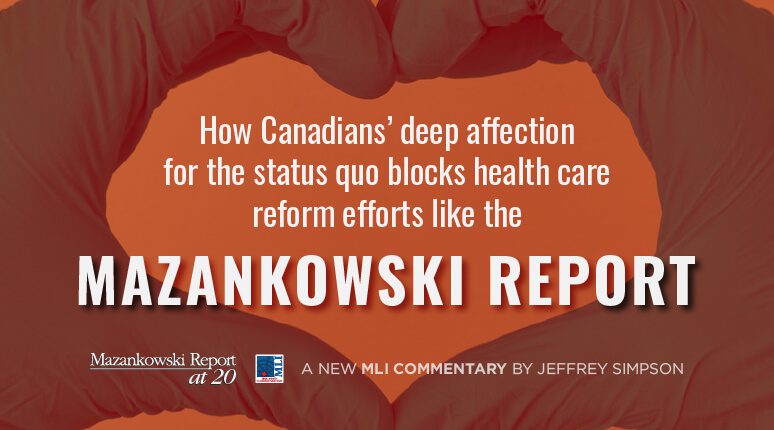As Canada grapples with an increasingly unsustainable health care system, Jeffrey Simpson examines how Canadians’ deep affection for the status quo poses barriers to reforms.
OTTAWA, ON (January 18, 2022): Despite evidence to the contrary, many Canadians still cling to the myth that our health care system is among the world’s fairest and most effective. However, with the COVID-19 pandemic giving the lie to this fantasy, will Canadian policy-makers finally embrace needed reforms?
In a new commentary titled, “How Canadians’ deep affection for the status quo blocks health care reform efforts like the Mazankowski report,” author Jeffrey Simpson examines how Canadians remain wedded to an inadequate status quo that is prohibiting reform. Indeed, the pandemic notwithstanding, Canadians generally show few signs of letting go of the misguided views about our health care system.
A variety of reports have for decades warned about the issues facing Canadians’ health care. The Canadian Medical Association (CMA) in 2010 concluded that the system was not delivering value for money. Despite Canada being among the highest per-capita spenders of health care, our outcomes for patients are subpar. Additionally, in 2000, a World Health Organization (WHO) report warned that our heath system funding was bound to create deep structural challenges, and recommended changing the ways in which health care is paid for.
“Canada’s health care spending was among the highest for countries with largely public systems,” notes Simpson. Yet despite the inflated spending, “international comparisons long after the 2000 WHO report consistently showed Canadian medicare to be a poor-to-average system when compared to largely public health care systems in advanced industrial countries.”
The Mazankowski report, which examined Alberta’s health care system, had reached similar conclusions many years ago. The report recommended a substantial overhaul of the system, including new methods of financing medicare as overspending in health care risks squeezing out precious fiscal resources needed for other social programs while creating unsustainable fiscal drags for provinces. The Mazankowski report pointed to the benefits of allowing more private payments, a proposal that would prove far too controversial in Canada.
For Simpson, the challenge is rooted in a misconception that private payments would make our system too similar to the American system. Despite being a common practice throughout much of the developed world, including in countries that have equitable and universal systems, the idea never resonated with Canadians.
Despite clear challenges, the majority of Canadians remain satisfied with the system, notes Simpson. Those able to endure long waits tend to find good quality of care. Yet citizens from other countries – including Germans, Swiss, and Australians – report higher levels of satisfaction when it comes to their systems, which have private payment elements. Simpson also points to the lack of political will in Canada to dare to question the essential structure and method of financing medicare, and importantly very few think tanks or academics are willing to shake up the status quo.
For Simpson, these perspectives remain entrenched and shine light as to why recommendations for wholesale changes, as in the Mazankowski report, have fallen flat.
“Some day, maybe, the already stretched Canadian health care system will so alarm enough Canadians who wait too long for access that Mazankowski-type changes in the private/public mix might find some receptivity,” writes Simpson. “Alberta and the rest of Canada are not there yet.”
Simpson’s commentary is the second in a three-part series on the 20th anniversary of the Mazankowski Report. You can read part one, former Saskatchewan finance minister Janice MacKinnon’s commentary, here.
Next week: Jack Mintz on reforming Canada’s health care funding.
To read the full commentary, click the button below.

***
Jeffrey Simpson is an Officer of the Order of Canada and was The Globe and Mail’s national affairs columnist during which time he wrote about almost all the major Canadian public policy issues, and many international questions.
For more information, media are invited to contact:
Brett Byers
Communications and Digital Media Manager
613-482-8327 x105
brett.byers@macdonaldlaurier.ca
In producing this publication, Simpson has worked independently is solely responsible for the views presented in the publication.





